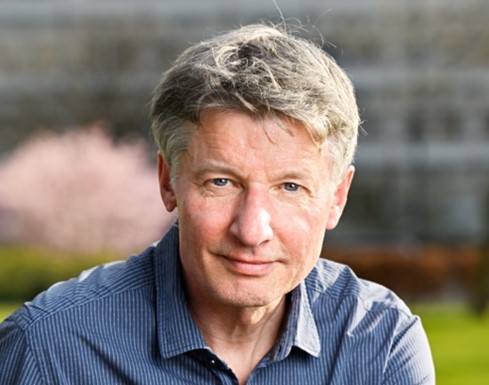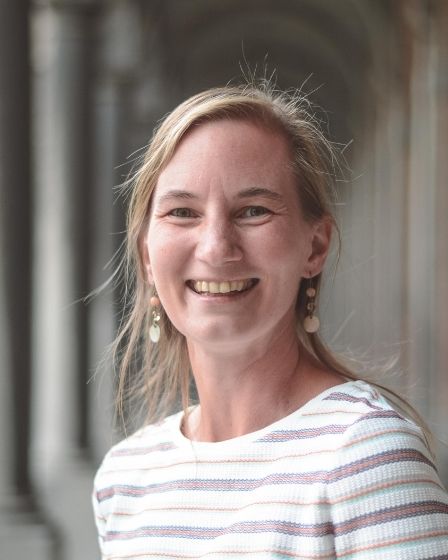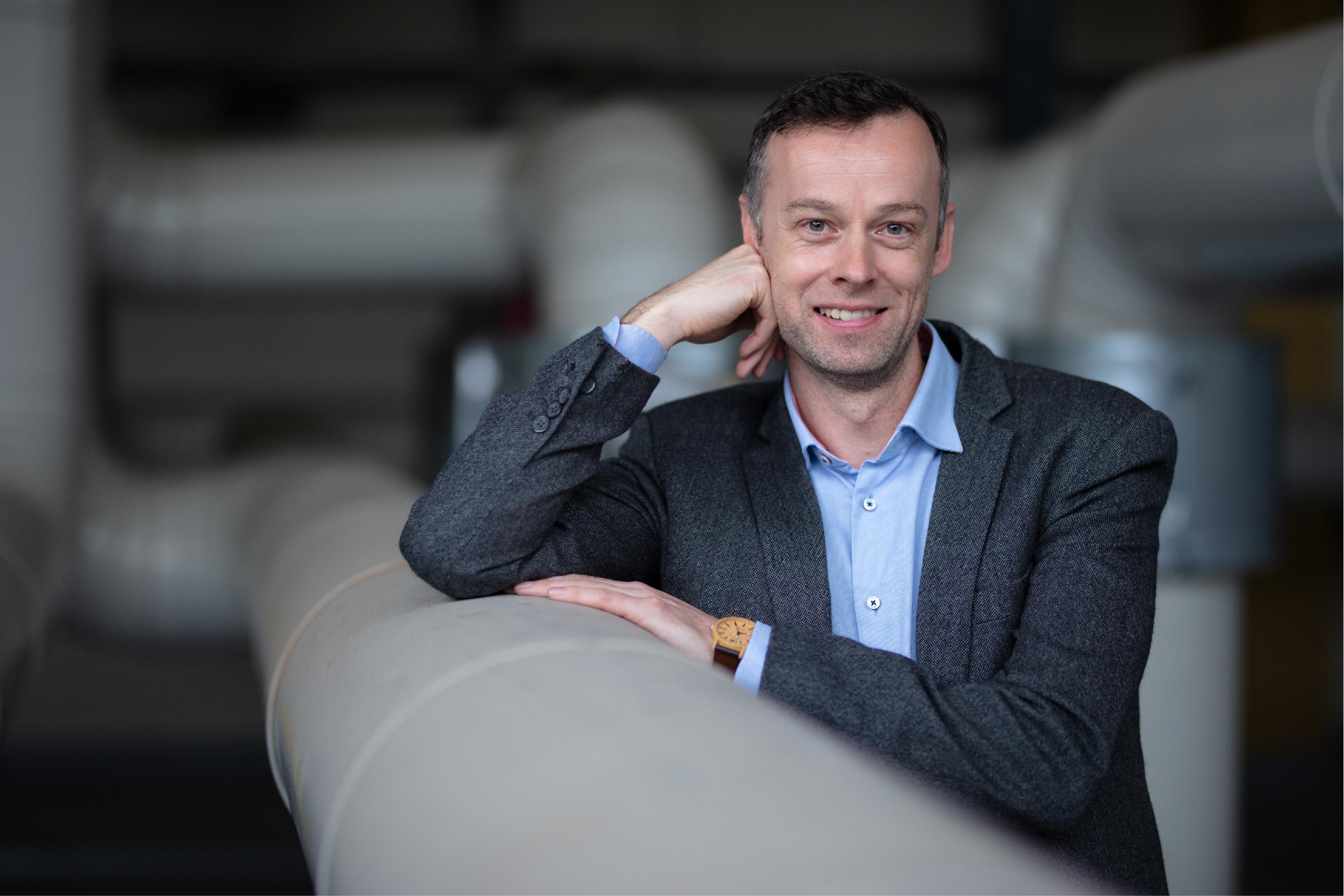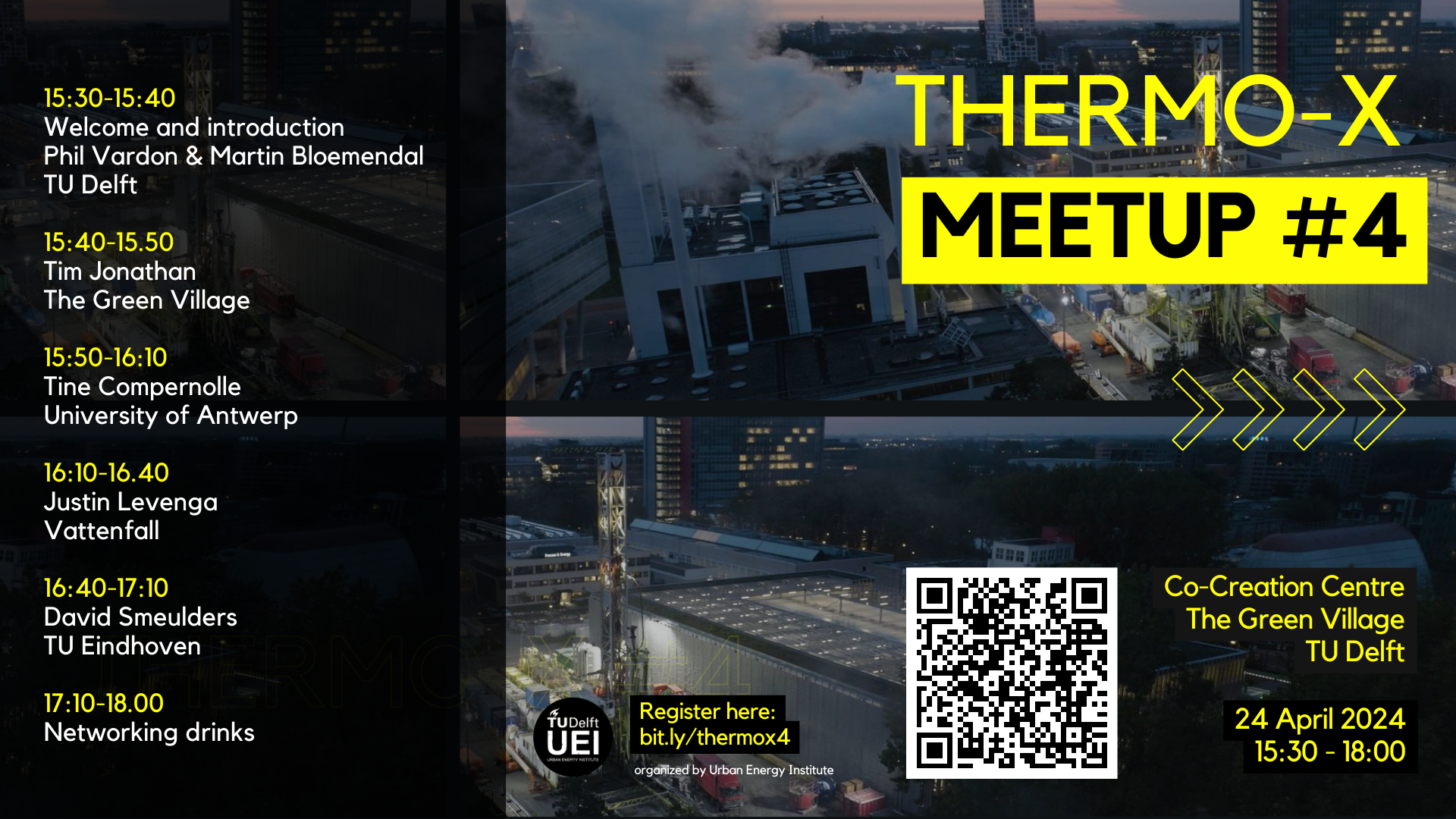Thermo-X Meetup #4
24 april 2024 15:30 t/m 18:00 - Locatie: Co-Creation Centre at The Green Village - Door: Urban Energy Institute | Zet in mijn agenda
Thermo-X platform is hosting its fourth meetup. Don't miss out on the chance to learn from and connect with fellow professionals working in the field of thermal urban energy systems.
Date: Wednesday 24 April, 2024 15:30 - 18:00
Location: Co-Creation Centre at The Green Village
Program
- 15:30-15:40: Welcome and introduction to Thermo-X and update on the campus geothermal well project – Phil Vardon and Martin Bloemendal TU Delft
- 15:40-15:50: Overview of thermal energy innovations at The Green Village - Tim Jonathan, Manager, Operations and Realisations, The Green Village
- 15:50-16:20: Presentation by Tine Compernolle, University of Antwerp: Interdisciplinary research for subsurface management
- 16:20-16:50: Presentation by Justin Levenga, Vattenfall: Heat storages for the heat grid in Amsterdam
- 16:50-17:10: Presentation by David Smeulders, TU Eindhoven: Thermal energy storage in porous media
- 17:10-18:00: Networking drinks
About the Speakers

David Smeulders, Professor Energy Technology, Eindhoven University of Technology
Presentation: Thermal energy storage in porous media - Porous media are key for the energy transition. They can actively and passively store thermal energy to cope with diurnal and seasonal mismatch between supply and demand of heat. In this presentation some examples of recent developments in industrial heat storage and low-temperature applications in built environment will be discussed.
David Smeulders holds an MSc in Aerospace Engineering from Delft University of Technology and a PhD in Applied Physics from Eindhoven University of Technology, Netherlands. Between 1992 and 2010 he was assistant/associate professor at the Civil Engineering and Geosciences Department at Delft University of Technology, where he was also scientific director of the Geotechnology Laboratory (2007-2010). In 2010 he was appointed full professor at the Mechanical Engineering Department at Eindhoven University of Technology, where he chairs the Energy Technology group. He is (co)-author of more than 200 scientific publications and member of the Dutch national ‘topsector’ board TKI New Gas, Scientific Director of the 4TU Energy Centre and member of the NWO DeepNL research program committee. He was member of the sounding board to the parliamentary enquiry of the Groningen gas field. His expertise is in energy storage and conversion, transport in porous media, and flow-induced vibrations.

Tine Compernolle, FED-tWIN researcher, University of Antwerp and the Royal Belgian Institute of Natural Sciences – the Geological Survey of Belgium
Presentation: Interdisciplinary research for subsurface management
Tine Compernolle is currently FED-tWIN researcher at the University of Antwerp (Assistant Professor, 50%) and the Royal Belgian Institute of Natural Sciences – the Geological Survey of Belgium (RBINS – GSB, senior researcher 50%). She has a PhD in Applied Economics (2012, UHasselt) and a master in Applied Economics (2008, UHasselt). She worked as dr.-assistant at the UHasselt from 2013 until 2016 and in 2016 she was granted an FWO post-doctoral fellowship for which she executed the research activities at the UAntwerp as host institution. From 2016 was also an invited scientist at the RBINS-GSB. In 2020, her strong partnership with the Geological Survey of Belgium wass been consolidated in a FED-tWIN profile named Geological Economics in which Environmental Economics and Earth Sciences are united to focus research activities on the sustainable management of the subsurface.
Tine her research approach has always been interdisciplinary, as an environmental economist she collaborates with experts in biology, hydrogeology, chemistry, and geology on environmental topics such as the remediation of groundwater pollution, the reduction of carbon emissions, and the adoption of renewable energy technologies. Together with the Geological Survey of Belgium, she develops geological economic models in which she adopts the real options theory to create understanding about the value of exploration and the value of flexibility option to manage the risks related to subsurface activities.
Justin Levenga, Green Heat Source Project Manage, Vattenfall
Presentation: Heat storages for the heat grid in Amsterdam
From 1991 to 1996 I studied tax law at the University of Groningen. After my studies, I worked as a tax advisor at EY and later as a corporate tax specialist at Nuon (predecessor of Vattenfall). Because of my interest in energy technology and the energy transition, I started a part-time study in mechanical engineering at Utrecht University of Applied Sciences in 2018. I followed the Sustainable Energy Systems specialization. I completed the study at the beginning of 2023, and since April 2023 I have been working as a Green Heat Source Project Manager at Vattenfall. I am working on the heat source strategy for heating networks, and on the first phase of the development of new green heat sources for heating networks, such as geothermal energy, aquathermal energy and industrial residual heat.

Phil Vardon, Professor, Energy Geo-Mechanics, TU Delft
Phil is the Professor of Energy Geo-Mechanics in the Section of Geo-Engineering. He leads the department theme in Geothermal Science and Engineering. His research is into complex coupled processes in geomaterials. He focuses on the impacts on soils / geomaterials of various processes including heat, moisture and contaminant movement, including practical applications such as geothermal energy, slope stability and radioactive waste disposal. He teaches on the undergraduate Soil Mechanics course and the postgraduate Geothermal Energy course.
Martin Bloemendal, Associate Professor, Underground Thermal Energy Storage, TU Delft
I am a specialist in Underground Thermal Energy Storage (UTES) and work on various studies on utilization of sustainable heat by means of seasonal storage in the subsurface. In these endeavors I always considers the system as a whole, which means not only the subsurface system, but also consumers and the required facilities to utilize the available heat. That is why I also have extensive knowledge of related and complementary techniques (ranging from well/borehole drilling and completion technology to heat pump, building facilities and control). My focus is not on the technical aspects only; I also work on organizational and policy-based issues concerning sustainable heating and cooling, as these are key for optimal and sustainable utilization of subsurface resources in practice. At TU Delft I work on various projects to further develop UTES and teach courses at various levels and faculties.
About the Thermo-X platform
Thermo-X is the TU Delft platform for thermal energy systems and has the ambition to bring together all the expertise of TU Delft on low and high-temperature heat. The platform aims to play a major role in the energy transition by developing thermal systems of the future that are sustainable, that balance supply and demand, and that are accepted by the public. The platform covers all relevant fields of expertise required for this transition. To learn more visit https://www.tudelft.nl/thermo-x.
Questions? Email us at urbanenergy@tudelft.nl
